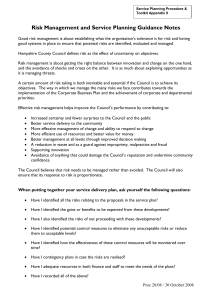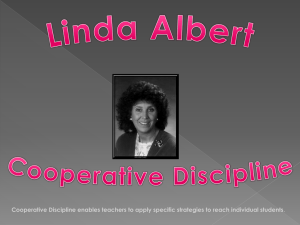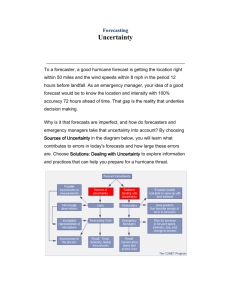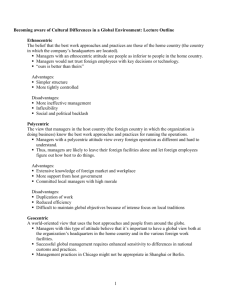CHOOSING AN INFORMATIVE TOPIC
advertisement
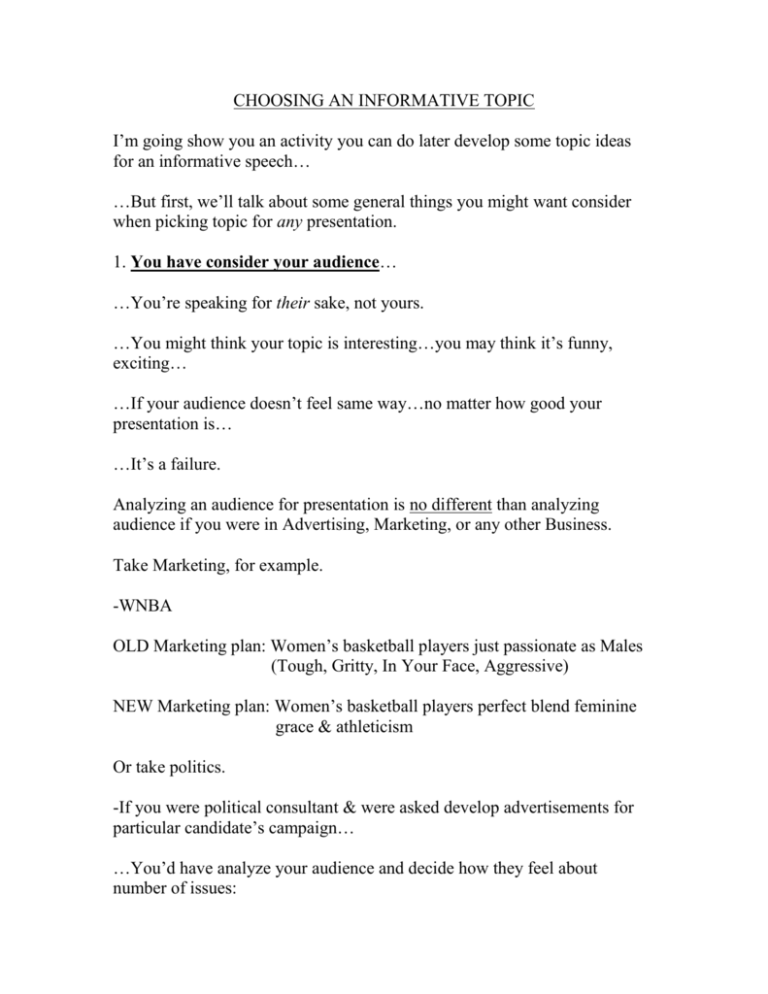
CHOOSING AN INFORMATIVE TOPIC I’m going show you an activity you can do later develop some topic ideas for an informative speech… …But first, we’ll talk about some general things you might want consider when picking topic for any presentation. 1. You have consider your audience… …You’re speaking for their sake, not yours. …You might think your topic is interesting…you may think it’s funny, exciting… …If your audience doesn’t feel same way…no matter how good your presentation is… …It’s a failure. Analyzing an audience for presentation is no different than analyzing audience if you were in Advertising, Marketing, or any other Business. Take Marketing, for example. -WNBA OLD Marketing plan: Women’s basketball players just passionate as Males (Tough, Gritty, In Your Face, Aggressive) NEW Marketing plan: Women’s basketball players perfect blend feminine grace & athleticism Or take politics. -If you were political consultant & were asked develop advertisements for particular candidate’s campaign… …You’d have analyze your audience and decide how they feel about number of issues: *America World’s Police Force vs. Isolationist Preference *Strict Trade Laws vs. Free Trade/Free Market *Religious vs. Not Religious *Poor vs. Wealthy *Urban Residents vs. Rural Residents…etc. So when your picking topic for speech or presentation… …The FIRST thing you have do is analyze your audience…& then you can consider whether particular topic will work. Now for this class…you really don’t have time or resources to do complete audience analysis… …But you do know some general information about your classmates. So as we’re talking about different audience analysis considerations… …be trying think how you can relate things we talk about to your classmates. So, before we get into some specifics, what are some things we already know about this audience? (CLASS DISCUSSION NOW) The following are list of things you should think about before every speech you ever give. 1. How do you think audience will perceive you? A. Do you think audience will view you as Credible? Not Credible? Ex. Let’s say your giving presentation on how shoot basketball. If you’re highly credible (i.e., Played College or NBA ball…Coached for many years)… …You have a lot of leeway. You can be very authoritative & adopt “It’s my way or highway approach.” You wouldn’t need talk spend a lot time talking about all players you’ve trained, coaches who endorse your method. You probably would have more to lose than gain by putting on shooting display yourself. On other hand…if you have low credibility…you probably would want talk about all players you’ve taught… …Maybe you’d even want bring couple along w/ you give testimonials. & in this case…you’d probably have a lot gain by actually putting on live shooting demonstration. So always keep in mind how your audience will most likely perceive you…& make appropriate adjustments 2. Consider audiences’ perception of topic Ex. Let’s say you’re Ian & you want inform class about pros & cons of NAFTA (North American Free Trade Agreement) Judging from my brief mention of politics during semester…not too many you guys are too into government & economics… …So Ian would have to do good job convincing you that NAFTA directly affects you... …Maybe because of NAFTA CD’s & Designer Clothes are more expensive… …On other hand, maybe NAFTA lowers price of Corona & therefore you guys think it’s good thing. 3. Consider audiences’ needs & motivations. Ex. If you’re interested in travel…want do speech on best vacation spots…If you’re talking to college students… …You probably want talk about places with wild night life… The average college students probably not interested in visiting Historical Museums in Russia to learn details of Bolshevik revolution. 4. Consider social groups your audience belongs to. Who you spend your time w/ says a lot about your beliefs, attitudes, goals, desires, and so forth. Ex. If you were trying pitch product to bunch of Ivy League Graduates… …you probably wouldn’t want to tell lot of “high school dork” jokes, because most people who go Ivy League Schools dorks high school. So one way to subtly analyze your audience (because many times people don’t like answering direct questions about themselves is to… …simply give them piece paper & ask them list any formal/informal organizations or groups they belong to. 5. Consider the Occasion. Obviously, toasting the best man @ bachelor party would involve different topic than toasting him at wedding reception. But even for school presentation you have to be careful not to: (a) Offend/Irritate/Bore your instructor (since he’s grading you) (b) Offend/Irritate/Bore your classmates… (Because very difficult give presentation when audience is giving you dirty looks or sleeping) 6. You need to consider demographic makeup of your audience: *AGE Ex. If you were giving speech on social security, young people would want to learn about: (a) How social security affects their taxes (b) If system will even be around when they retire However, older people would want to learn about: (a) Potential legislation cutting benefits (b) Maybe…Cost Living Increases…so forth. *GENDER Now obviously, in class like this…you can’t win. So what you need do is relate your topic to as many different perspectives as possible. Ex. If you were informing mixed gender audience of adults about how enjoyable day at ball park can be…You would want to stress: (a) The exciting baseball action (b) The great food, comfortable seating, between innings entertainment, family atmosphere Now, presumably, Men would more likely be interested in actual game… …Women in extracurricular entertainment. However, what you don’t want to do is say: “For the men…” “For the women…” …because some audience members may feel stereotyped. Instead, just say: “For those of you who love baseball… “For those of you who like to eat… “For those of you who want family atmosphere…” etc. *CULTURE Ex. A Low Uncertainty Avoidance cultural tendency predominates in Canada, Hong Kong, and India… A High Uncertainty Avoidance cultural tendency predominates in France, Greece, and Argentina. Low Uncertainty Avoidance cultures tend to view deviant or different behavior as “curious” and “interesting…” High Uncertainty Avoidance cultures tend to view deviant or different behavior as “dangerous” and “threatening.” So if you were informing High Uncertainty Avoidance culture about another culture’s different way of seeing or doing something… …You’d want to first stress any & all similarities other culture had, & then carefully inform audience about differences. On other hand, in if you were speaking Low Uncertainty Avoidance Culture… …If you used same strategy, you’d either: (a) be wasting your time… (b) lose audience interest because they wouldn’t consider “similar” to be interesting *EDUCATION LEVEL (a) Don’t pick topics either too simple or too complex for your audience (b) Don’t patronize uneducated audiences. *INCOME LEVEL For example…I was in class where older, married student gave informative lecture on how to obtain home mortgage… …Which is very interesting & useful information…but she was only person in class who had money think about that type thing. **So audience perceptions of you, topic, occasion… …audience’s age, gender, needs, social groups, so forth…are some things consider when choosing & writing about a topic… …But of course, you need pick topic that fits your needs as well. MY ADVICE IS: 1. Pick topic you (a) Already know something about (b) Have experience talking about (c) Provides you & audience w/new information (d) Is classroom appropriate (e) You can cover in time limit…which means… 2. Make your topic as specific as possible. BAD TOPIC: “France” GOOD TOPIC: “The Top Three Vacation Destinations in Northern France” BAD TOPIC: “How to Cook” GOOD TOPIC: “How to Make Spaghetti in 10 minutes” BAD TOPIC: “The life of Abraham Lincoln” GOOD TOPIC: “How Abraham Lincoln Learned to Read.” 3. Pick a Topic that’s easy to research…which we’ll talk about more next time.

